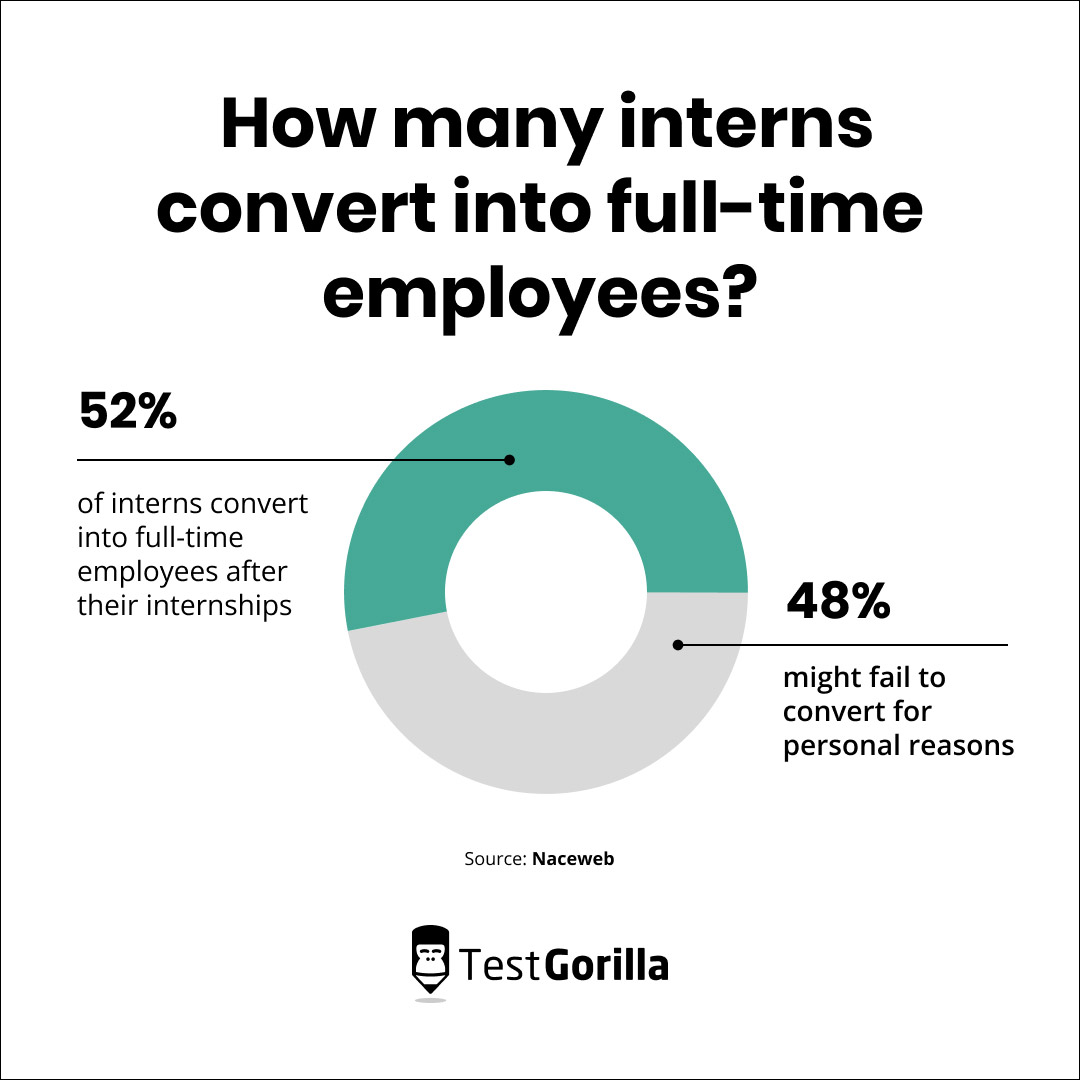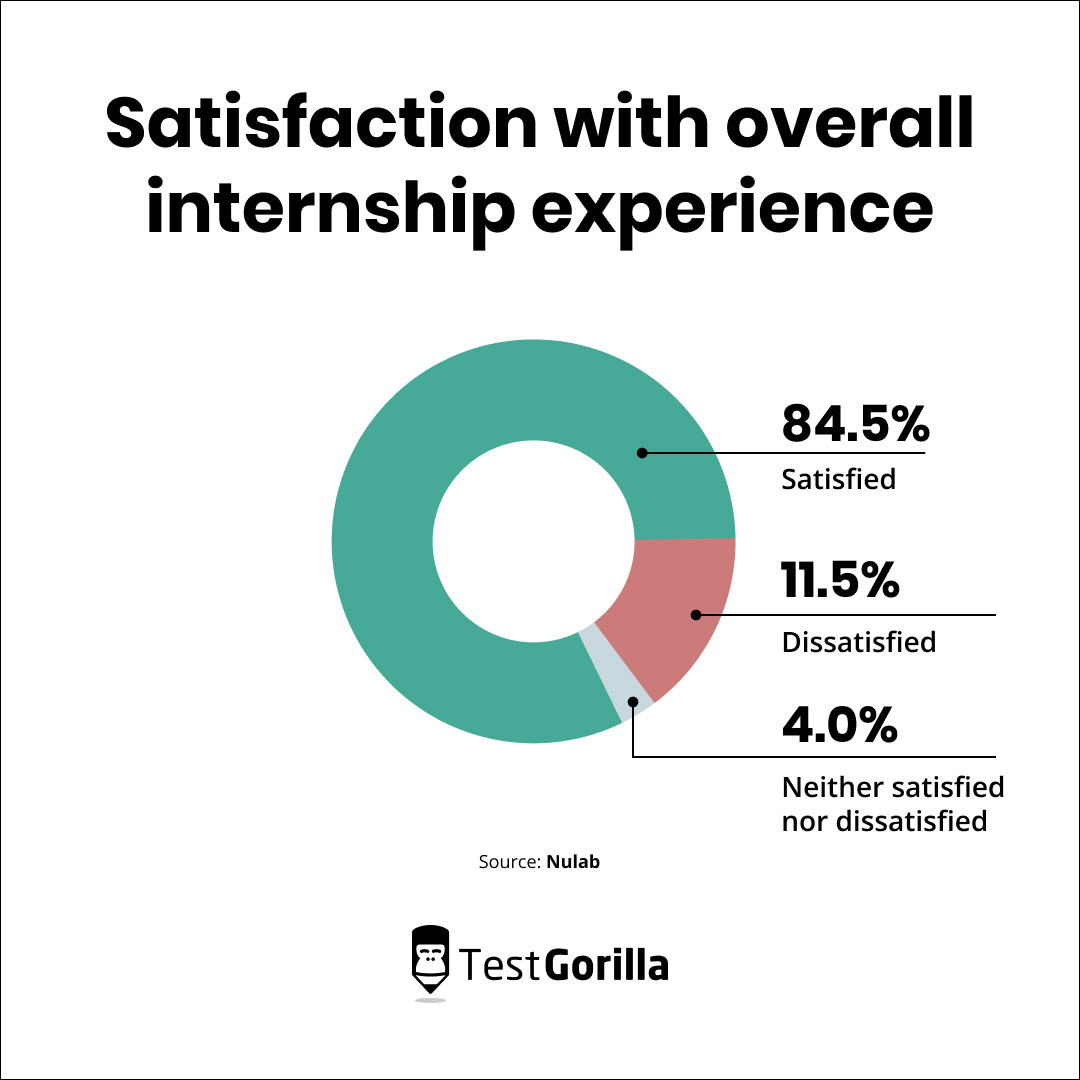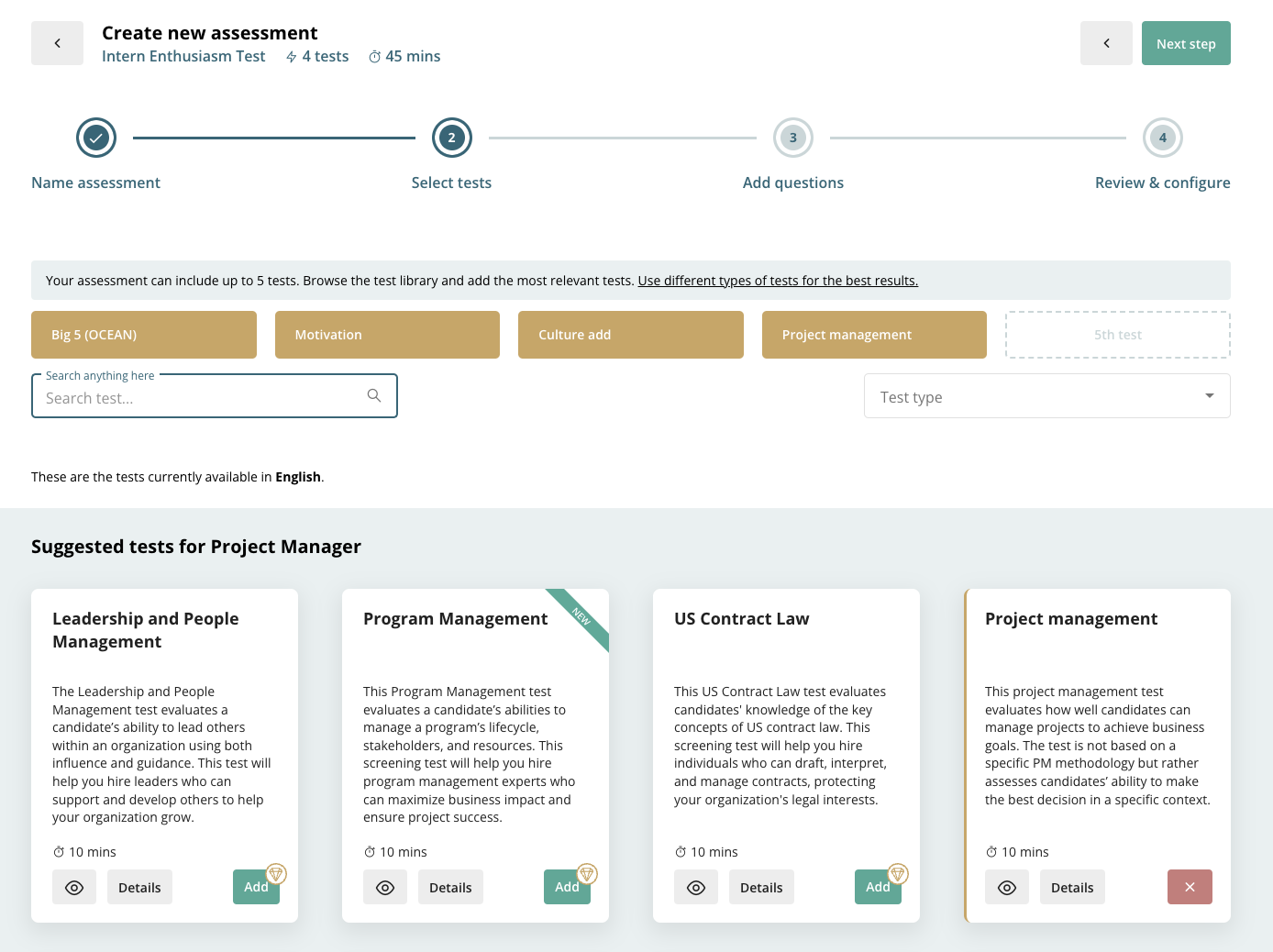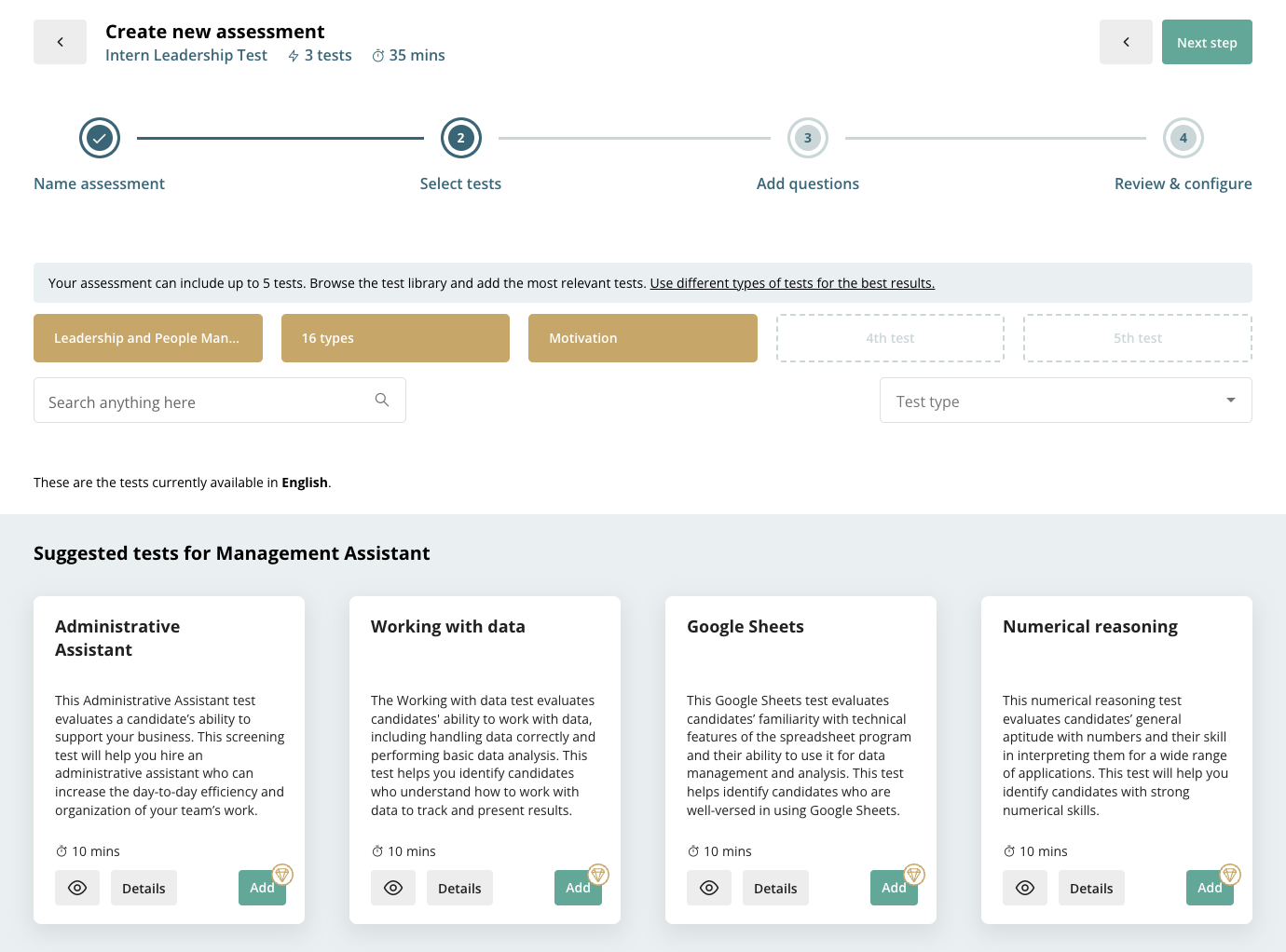There are plenty of great reasons to hire an intern.
To start, you benefit from an enthusiastic entry-level professional who’s raring to learn.
For them, it's an exciting opportunity to start building a career in a competitive industry. For you, it's a fresh recruit likely to go the extra mile.
However, hiring interns is challenging because your recruits might not have any obvious work experience.
How do you know your intern is a good fit for your workplace and principles?
Here’s where talent assessments come in handy.
By skills testing interns before onboarding, you:
Find out more about their ethics and principles
Discover potential upskilling opportunities
Build talent pools of candidates showing genuine promise
Accurately measure decision-making and time-management skills
Below, we explore common intern hiring difficulties and how talent assessment tools help streamline the process.
The difficulties with hiring interns
When you hire interns, you likely want to retain those with the most aptitude, passion, and respect for the job. These virtues aren't always simple to measure through resume screening alone.
Although intern hiring intention is rising among participating companies, research shows only 52% of interns convert into full-time employees after their internships.
The remaining 48% might fail to convert for personal reasons, but it's still clear companies are struggling to retain top talent after they complete their internships.
That said, interns are generally pleased, overall, with how their internship experiences turn out, regardless of whether or not there’s a job offer on completion: A survey on Nulab interns revealed they were overall satisfied with their experience. - 84.5% said they were satisfied - 11.5% said they were dissatisfied - 4% said they were neither satisfied nor dissatisfied
It’s easy to assume all interns are bright-eyed and enthusiastic. However, there’s no guarantee on how they might blend with your culture or adhere to your policies once on board.
Before we look into how talent assessments improve your intern hiring process, let’s consider some of the most common difficulties you might face as a human resources professional when hiring the “right fits”:
Potential difficulty | Explanation |
Interns might have blank resumes | Entry-level hires might not have years of experience on their resumes for you to measure and compare against (leading to guesswork) |
You have no professional references | Unlike hiring experienced professionals, interns don’t always have industry references to prove their reliability right away |
Interns might grow bored with their roles | With zero working experience, there’s a risk that interns tire of the work they do for you and stop taking it seriously |
You can’t measure commitment right away | As you might be their first "real" employer(s), interns have no precedents to measure you against and thus struggle to commit to your company and its values right away |
Interns might slow down productivity | Interns who "look good on paper" might not always work well with pre-existing teams and setups; they might require hand-holding and extensive coaching (thus slowing down processes) |
Retaining exceptional talent | Those interns who are exceptionally talented might not remain with your company if you lack professional development opportunities or a culture of learning and development in general |
Some interns struggle with pressure and pace | Without practical, hands-on experience in fast-paced working environments, some interns might crumble easily under pressure; you might not find this out until it’s too late |
Interns feel isolated and removed from your culture | Some interns might struggle to get on board if their hiring experience is impersonal (with few 1:1 meetings or personalized coaching opportunities) or companies only focus on the financial benefits of their hiring |
How talent assessments help you hire interns
Before setting up talent assessments and skill-based hiring initiatives, it's good practice to plan for welcoming college graduates and entry-level employees into your firm.
For example, consider:
How your projects relate to the industry they care about
How you intend to build engagement with your intern(s)
Who’s responsible for training and guiding said interns
The overall benefits to your company in terms of labor and cost-savings
Clarity is key, too. Source interns from local colleges, universities, and entry-level programs with clear job descriptions on things like:
Roles and responsibilities
Day-to-day workload expectations
Tools needed
Supervisory and reporting teams
What you expect long-term
Once you have a clear framework to welcome and train interns, you should start sewing talent assessments into the application process.
Here are a few benefits and why you should.
You give interns a chance to shine
Skills-based hiring goes against the well-worn concept of “experience and education first.”
Although education is likely the biggest draw for many recruiters starting to hire an intern base, many applicants are disadvantaged because they don't yet have work histories to refer back to.
With talent assessments, you enable interns with the skills and aptitude to objectively "prove" themselves (and without the resume data).
You remove unconscious bias, too, such as only accepting hires from Ivy League schools. A non-Ivy intern could be just as adept at the role, if not more so, as those from Yale, Brown, or Harvard.
Talent assessments are useful in identifying potential HiPOs (high potential employees) long before onboarding and training.
You easily prioritize graduates who work well with others
Although the "best" graduates and hires on paper might have the technical skills you need to help support your projects, it's difficult to tell whether or not they blend well into your team.
Therefore, use talent assessments such as the Communication test to immediately identify who’s the best of your applicants at listening to others and sharing ideas.
A culture-add test, too, could help you hire interns who resonate deeply with your values and mission.
Using talent assessments this way helps you avoid onboarding otherwise promising hires who fail to cooperate well with your existing setup.
You eliminate guesswork
Although resume recruiting has weathered decades of hiring practice, it's not ideal for measuring technical and interpersonal skills. Graduating from a specific program or degree doesn't mean an intern has the passion, aptitude, or motivation to succeed in your organization.
Relying on resumes revolves around making risky predictions and trusting one's gut. It's no longer a sustainable way to find the "best of the best."
By introducing skill assessments, you eliminate concerns about missing power skills or an intern’s work ethos by supporting your decisions with hard data.
You keep your talent pool full
Interns boost internal talent pool management and keep them fresh with enthusiastic people willing to learn skills.
Relying on resumes and archaic hiring methods to source interns shrinks your talent pool. You stand to exclude potentially talented job seekers based on a lack of work experience or on biased elements.
Hiring interns based on skills instead of resume data helps to keep your talent pool broad and diverse, and also reduces bias. You have more highly-engaged people to cross-promote and move around your talent map, too.
You remove time-wasters
Exaggerated claims are commonplace on resumes, and it's not just limited to when you're recruiting interns – 85% of recruitment agents claim job applicants embellish their education and skill sets on their resumes.
Given interns' (assumed) lack of work experience, your hires have a high risk of inflating their resumes to stand apart from the pack.
By hiring interns purely on their words and their education experience alone, you risk applicants being less than adequate in practice.
Skill assessments enable interns to prove themselves. You get to see from raw data which hires “walk the walk.”
You save time and money otherwise wasted having to pick up the slack from interns who otherwise inflated their applications.
The best insights on HR and recruitment, delivered to your inbox.
Biweekly updates. No spam. Unsubscribe any time.
8 ways to use talent assessments to optimize hiring an intern
Now that we're clear on how skills testing improves how you hire an intern, let's look at a few ways to implement such tests.
Intern recruitment ideas: Summary
Technique | Explanation |
Culture test to find the best fits | Test intern applicants on values, ethics, and culture expectations to ensure they work well in your team(s) |
Ensure your candidates are serious about the role | Avoid resume guesswork and test for motivation and hyper-specific role aptitude |
Focus on power skills – not just the technical ones | Test for “human” and interpersonal skills interns need to collaborate effectively as part of your company |
Build a talent pool that’s ready to scale | Assess multiple categories that are important for your broader talent map (and a more agile workforce) |
Detach yourself from resume screening | Refuse to judge intern hires based on their education and experience (or lack thereof) alone, reduce guesswork, and boost hiring efficiency |
Hunt down potential leaders | Test for leadership qualities to potentially upskill and develop should interns wish to stay with the company |
Create a level playing field | Standardize all tests and assessments to remove bias in hiring, improve diversity, and broaden your talent pool |
Ask for feedback and continue to improve | Keep an open mind regarding editing and improving your testing plans, and refer to your hires for feedback |
1. Culture test to find the best fits
Culture add is a priority for companies and employees alike. It’s thought nine out of ten employers prioritize culture when hiring; however, eight out of ten professionals report having worked in a culture they disliked.[1]
Your internships give your hires their first taste of the industry and working life. It pays to find a strong culture add through talent assessment to reduce employee turnover and promote a happier, more productive workforce.
Seizing the enthusiasm and initiative many interns possess through a supportive culture is just as important. Therefore, consider creating an assessment based on a Culture Add test.
TestGorilla’s assessment builder enables you to quiz interns on their:
Attitudes
Work ethics
Value systems
Teamwork skills
Technical abilities
From here, you might compare this data and rank candidates on a culture add hierarchy.
The alternative is onboarding interns to find they dislike working for you, thus driving down productivity and wasting time, leading to a revolving-door culture.
2. Ensure your candidates are serious about the role
It's hard to tell if interns are passionate about the roles they apply for. With a lack of work experience, graduate applicants, for example, might feel they need to "get creative" with their resume writing.
What’s more, the rise of ChatGPT and generative AI is making it harder for recruiters to tell if intern applicants are genuine about their applications.
Research shows that up to 47% of college seniors in the class of 2023 consider using AI to write resumes and cover letters for them. Meanwhile, 25% of Generation Z already uses automation to create resumes.
Whether hiring Gen Z or otherwise, recruiters need to do more to filter out who's serious about applying. Although the use of AI shows technical and time management aptitude, it doesn't suggest an intern candidate is willing to put time and effort into applying for roles.
Get insight into candidate passion and motivation by creating a custom assessment profile through TestGorilla. Here’s an example of a custom assessment we’ve put together for a project management intern:
We've selected the Big 5 (OCEAN) test, which measures conscientiousness and openness, among other traits.
We’ve also included:
A Project Management test to measure aptitude
A Culture Add test to check if they align with our values
A Motivation test to help us understand what drives them
Overall, this setup shows us if the applicant is enthusiastic, technically skilled, and motivated enough for the role they’re applying for.
The above is just an example – you can add up to five tests in an assessment plan and adjust when needed.
3. Focus on power skills – not just the technical ones
Power skills (formerly known as soft skills) are human traits your interns need to show alongside technical aptitude. These could include interpersonal traits, empathy, critical thinking, and organizational skills during high-pressure situations.
Power skills are difficult to measure, and recruiters frequently make assumptions about them.
By assessing power skills when hiring an intern, you stand to find someone who is adaptable and flexible in the workplace and is likely easy to upskill and move across the talent map.
It’s good to test for power skills as early as possible. Companies such as Webhelp, for example, transform their hiring and training processes by focusing more on these interactive attributes, creating standardized roadmaps.
In this company’s specific industry, it’s resulted in more accurate job recommendations offered to their users.[2]
From the perspective of hiring an intern for your company based on raw talent, focus on communication testing to check how well they work with others, adding DISC personality testing to measure their dominance in group settings. Test for critical thinking and negotiation skills, too.
4. Build a talent pool that’s ready to scale
Testing interns helps you find skills gap opportunities and specialties. You could effectively build a thriving talent pool to upskill and train, making it easier for staff to take on other roles and responsibilities across your organization when needed.
Companies such as Henkel, for example, understand the need for employees to continue learning and developing.
The organization provides a customized learning experience to its 50,000+ employees, ensuring there's always room to upskill in line with changing customer demands.[3]
Interns wanting to develop with the right company are ready for upskilling and reskilling. This boosts retention and shows recent graduates and professionals you’re a company that invests in people and their skills.
Talent assessments during intern hiring further provide skill scores for you to cross-reference and build upon with training programs and initiatives.
It’s worth remembering that the skill levels your interns onboard with are never locked in – there's always room for improvement.
5. Detach yourself from resume screening
In the 2020s, resume evaluation is an often inefficient way to measure talent and interest. It is especially so when browsing intern applications, where there's likely to be more guesswork than with experienced applicants.
Replacing resume screening with intern skill testing enables you to target applicants who know they face judgment on aptitude alone.
Doing so removes the risk of unconscious bias, improves diversity hiring standards, and helps to cut time-to-hire (which is useful, for example, when high volume hiring mass college applications).
Companies such as Revolut now use skills-first hiring processes that boost time-to-hire speeds by up to 40% and ensure screening is more objective. This solution fights back against the rise of AI in intern resumes and applications.
Moving away from resume screening might seem daunting. However, you're helping interns to prove themselves beyond their experience. This practice works in their favor because they need more working experience to build upon in the first place.
6. Hunt down potential leaders
Similarly to hiring a contractor, it's fair to assume most recruiters don't look for leaders and managers when hiring interns.
However, skills testing early in the application process could identify potential leadership and people management traits useful for cross-promotion later.
You could also find niche skills that you might find useful for talent mapping in future.
Consider creating a talent assessment plan based on leadership and people management skills. You could combine this testing with a 16 Types Personality test to analyze decision-making patterns, and a Motivation test to gauge proactivity:
Once interns are onboard, design leadership development plan opportunities for those who show interest and aptitude should they wish to remain with you. You can boost retention and ensure a steady leadership flow for years to come.
7. Create a level playing field
Objectivity is difficult to manage when hiring an intern on resume stats and experience figures alone. Instead, talent assessments for interns help you to “blindly” rate applicants purely based on their raw skills.
Creating talent assessments removes the risk of evaluating interns based on their places of study or how long they've studied. Neither option denotes their talent in a given role or situation.
Building a level playing field with consistent tests and assessments helps to keep adjudication fair and broadens your talent pool even further.
This method helps strengthen your diversity and inclusion initiatives. It's a facet of hiring remote employees, too, and it applies to in-house and field interns.
With a custom TestGorilla assessment plan, you can create a solid foundation for intern processing by choosing personality assessments, culture tests, and critical power skills.
8. Ask for feedback and continue to improve
Always ask employees (interns included) for feedback on how effective they feel your assessment system is.
Be sure to collect data to measure how often your test setups resulted in long-term intern hiring. Also, check if there are any clear correlations between those interns that didn’t onboard and the tests you set.
Remember, setting assessments is never a finite process. Keep an open mind and go back to edit plans with alternative personality tests and culture assessments.
Ask for feedback from interns you hire for during the process, not necessarily at the end of the intern program. Therefore, you obtain reliable feedback before they determine whether their applications have been successful.
Remember, you can always edit and change assessment plans over time. Build a regular schedule to revisit and adjust as your recruitment goals change.
Beyond talent assessments: 3 best practices to remember when you hire interns
Although talent assessments are a must for hiring interns effectively, here are a few more must-dos to ensure you hire the best candidates for your roles.
1. Use structured interviewing
Structured internship interviews ensure all candidates get the same unbiased experience and score on the same criteria.
Structuring makes sorting and filtering responses easier before taking the next steps. You could use these scores alongside pre-interview scores to avoid further bias.
Using structured interviews with interns ensures clear confirmation of soft skill aptitude and a concrete idea of how they likely fit in with your organization.
Structured interviews used alongside skills testing remove even further risk of inaccuracy and the need for potentially harmful guesswork.
2. Follow labor laws in your state and sector
Remember, although unpaid interns might be financially beneficial, they're not always legal or approved in each state.
Before creating an internship program, seek legal advice and ensure your rights and those of your potential employees are protected.
Alternatively, consider running paid internships. Paid internship programs are frequently more structured and follow goals and patterns, attracting high-quality candidates. Whereas unpaid internships tend to be looser and more exploratory, often appealing to candidates looking for college credits. Furthermore, unpaid labor can have an unethical tinge to it – so paying your interns is one way to ensure your internships aren't exploitative.
Both have their benefits, but be sure to follow the law (like the Fair Labor Standards Act) in any case. Refer to guidance from the U.S. Department of Labor and your local government regarding for-profit businesses and non-profit organizations.
3. Partner closely with educational institutions
Instead of producing mass job board advertising for internship opportunities, you likely stand to recruit a warmer intake by directly advertising with colleges and universities.
Partnering gives you access to campus recruitment advertising and free online marketing. From the college students’ perspectives, they have easier access to a range of companies – from small businesses to multinational corporations – willing to help them advance their careers and earn academic credit over summer internships.
Colleges and universities benefit, too, because they show student interns that their courses and disciplines provide direct routes into work with well-known companies and brands.
Don’t start hiring interns until you test their skills
When it comes time to hiring interns, using talent assessments is a no-brainer.
Relying on resume screening alone means you make broad assumptions about your prospects, and given many interns lack work experience, you’re at higher risk of onboarding time-wasters.
By using skill assessments at the top of the intern hiring funnel, you:
Let interns show you what they’re genuinely capable of
Remove the risk of bias and subjectivity
Build an enthusiastic talent pool ready for upskilling
Filter and only ever hire hard-working people right for your culture
Talent assessments are beneficial beyond hiring an intern, too. For example, skills testing helps to ensure your employee training and development keeps focused, efficient, and beneficial for all.
To start building an intern-friendly skills assessment plan, head to TestGorilla’s test library for more inspiration.
Sources
“The Role of Workplace Culture in Recruiting Top Talent”. Robert Walters. Retrieved July 24, 2023. https://www.robertwalters.co.uk/content/dam/robert-walters/country/united-kingdom/files/whitepapers/Robert-Walters-Cultural-Fit-Whitepaper.pdf
Chilla, Ghita. (December 7, 2021). “Webhelp Case Study: Successful Job Placement with Soft Skills”. Talentoday. Retrieved July 24, 2023. https://www.talentoday.com/blog/case-study-webhelp-job-placement/
“Setting up for skilling up: Henkel’s smart bet for innovation and growth from sustained upskilling efforts”. (2021). Accenture. Retrieved July 24, 2023. https://www.accenture.com/content/dam/accenture/final/a-com-migration/custom/_acnmedia/pdf-164/Accenture-Henkel-CaseStudy-Long-Narrative.pdf
You've scrolled this far
Why not try TestGorilla for free, and see what happens when you put skills first.


















